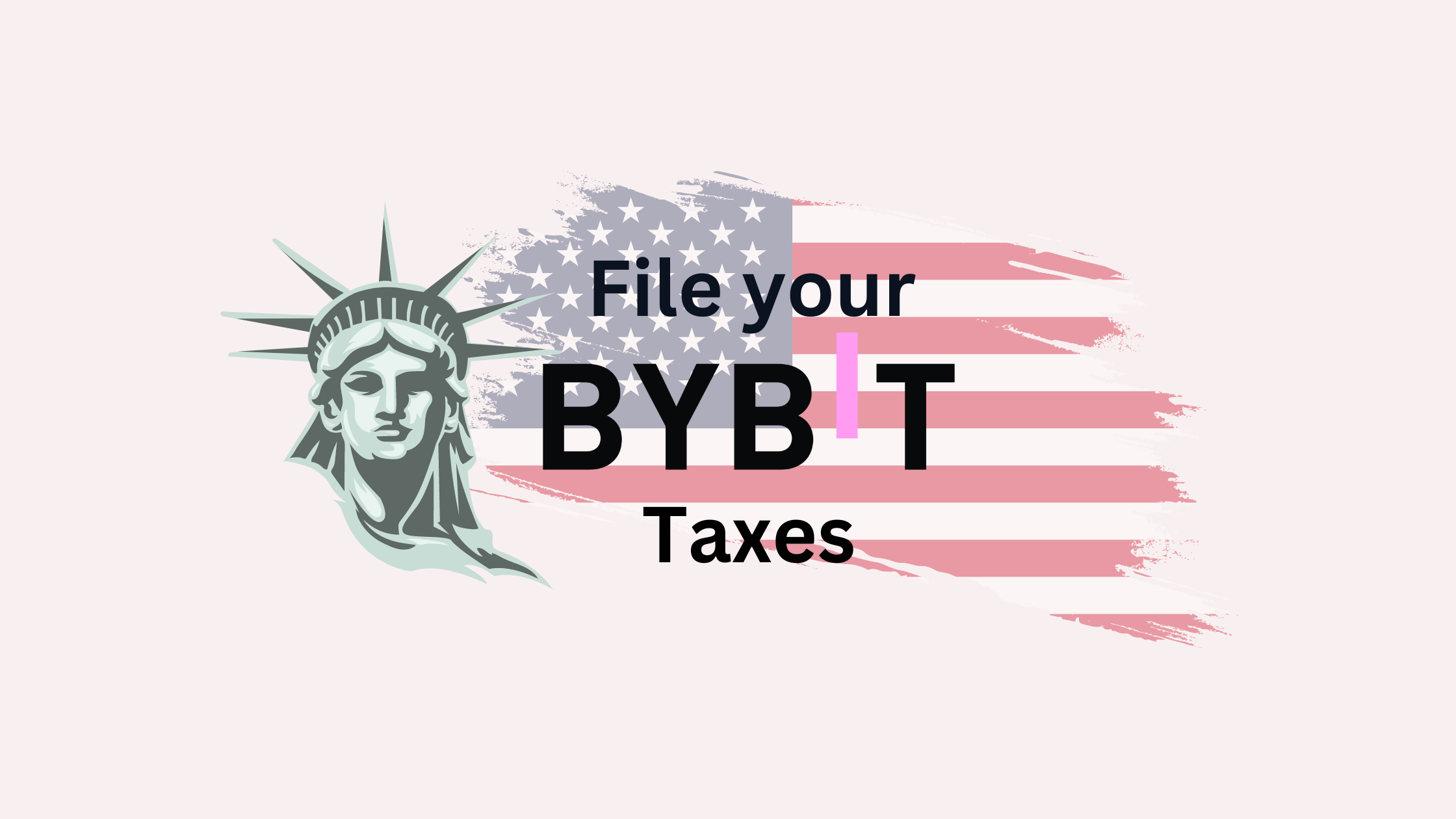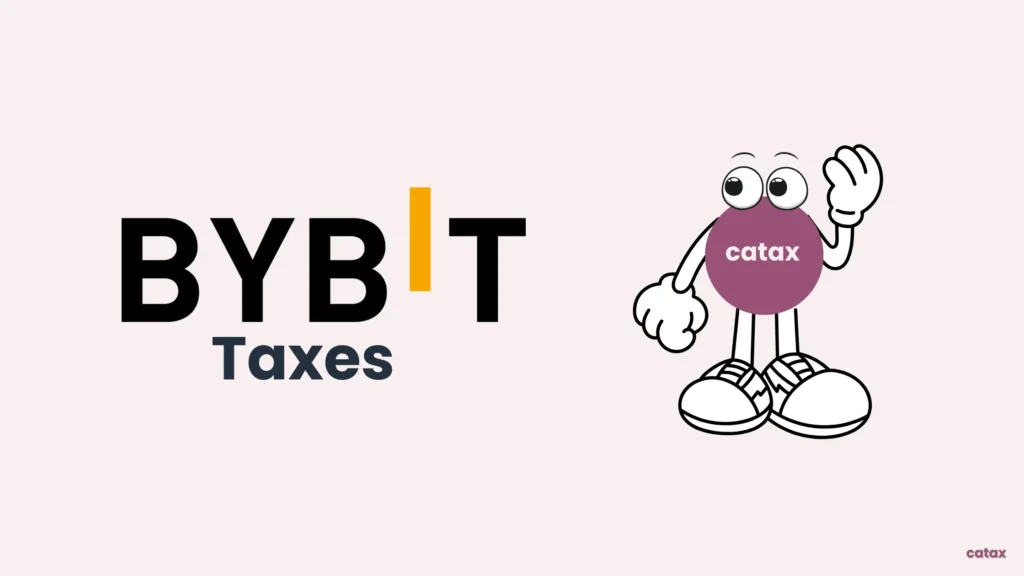This guide helps you figure out, calculate, and file Bybit Taxes in the USA. It gives you clear and simple instructions, making it easy to go through the process accurately.

Do you have to pay taxes on Bybit and crypto?
Absolutely, in the US, your earnings from cryptocurrencies like those traded on Bybit can indeed be taxable. The Internal Revenue Service (IRS) requires you to report any profits from crypto as capital gains and considers any crypto received as payment as income.
Understanding Taxes on Cryptocurrency

Understanding cryptocurrency taxes is about knowing a few important things:
- Taxable Events: When you engage in transactions with crypto, such as trading, spending, or receiving payment, each instance is considered a taxable event. As a result, you may be responsible for paying taxes on these activities.
- Capital Gains and Losses: profits from selling or trading crypto might result in having to pay taxes on those gains. If you’ve held onto your crypto for a significant period, you may benefit from lower taxes. And, on the flip side, experiencing losses may also have a positive impact on your taxes.
- Holding vs. Transacting: Simply holding onto cryptocurrency without selling it does not necessarily mean you are immediately responsible for taxes. Taxes are only applicable when you sell or use your cryptocurrency.
- Income Tax: Mining or receiving cryptocurrency is taxable income, and you must pay taxes on its value at the time.
Understanding Crypto Taxes in the US
Think of Bitcoin and other cryptos as a piece of real estate or a share in the stock market. That’s how the IRS sees them when it’s tax time. You could be looking at either Income Tax or Capital Gains Tax based on your crypto moves. The tax you owe on your crypto transactions depends on how you’re engaging with your digital assets. Let’s break down what that means for your wallet.

Does IRS Track Your Transaction?
Yes – the IRS can track crypto. So if you’re asking yourself ‘Do I have to pay taxes on my crypto gains?’ Or ‘Does the IRS know about my crypto investments?’ Stop right there.
- All major crypto exchanges must now complete KYC (Know Your Customer) checks.
- Exchanges process banking information where they accept fiat payments in exchange for crypto.
- Many exchanges also have records of crypto addresses you’ve withdrawn funds to – so they can identify custodial wallets too.
- Exchanges can track the crypto addresses to which you’ve withdrawn funds, identifying custodial wallets.
- The IRS has won cases against Coinbase, Kraken, and Poloniex, forcing them to share customer data.
Does Bybit submit IRS reports?
Bybit US tells the IRS when users make over $600 from things like staking or referrals. They send a tax form to both the user and the IRS to report this income. This way, the IRS knows how much money people are making from cryptocurrency and can tax it properly.
Understanding IRS Tracking on Crypto
The answer is likely yes if you’re wondering whether the IRS is in the loop about your crypto earnings. Here’s why:
Crypto exchanges are now required to know their customers — this is known as KYC, and it means they collect your info. When you use money to buy crypto, exchanges handle your banking details, which are linked to your identity. Withdrawal records from these exchanges show where the crypto’s going, often leading to wallets that hold your assets. This data trail means the IRS can connect the dots back to you. Legal actions have enabled the IRS to get user data from big names like Coinbase, Kraken, and Poloniex. So when thinking about “Bybit Taxes in USA,” remember that the IRS has its ways of keeping tabs on your crypto transactions. If you’re curious, read about 1099 forms, IRS transactions with Coinbase, and other ways the IRS tracks crypto activities.
Knowing Your Tax Responsibilities
Let’s start with the basics: The IRS views cryptocurrencies as property, similar to how you’d view owning a car or a home. What this means for you is that every time you sell, trade, spend, or earn cryptocurrencies, it’s important to report it all when tax time rolls around, just as you would with any other piece of property you own.
What is the tax rate on cryptocurrency transactions in the USA?
In the USA, the tax rate on cryptocurrency transactions varies depending on the nature of the gain (capital or ordinary income) and the duration for which the cryptocurrency was held. Here’s a breakdown based on the information from Koinly, NerdWallet, and CoinLedger:
Capital Gains Tax on Cryptocurrency
Short-term Capital Gains: Your ordinary income tax rate applies to any profits from the sale, trade, or use of the cryptocurrency if you’ve held it for less than a year, as they are taxed as short-term capital gains. These rates range from 10% to 37% depending on your income level for the tax year 2024.
Long-term Capital Gains: For cryptocurrencies held for more than a year before selling, trading, or using, you’ll pay long-term capital gains tax, which is generally lower. The rates are 0%, 15%, or 20% based on your total income, with specific thresholds determining the applicable rate. For example, single filers with a taxable income up to $44,626 may qualify for the 0% rate for the tax year 2023, shifting to $47,026 for the tax year 2024.
Income Tax on Cryptocurrency
Depending on your tax bracket, cryptocurrency earned via mining, staking, or services is taxed as ordinary income. The tax brackets for the tax year 2024 range from 10% to 37%, with the brackets adjusted slightly upwards due to inflation.
Special Considerations
- NFTs: If your NFTs are considered collectibles and held for more than a year, they may be taxed at a 28% long-term capital gains rate.
- Losses: Cryptocurrency losses can offset gains and reduce your taxable income, potentially lowering your tax bill.
- IRS Tracking: Despite cryptocurrencies being somewhat anonymous, the IRS has mechanisms to track transactions and enforce tax obligations.
To ensure compliance and possibly optimize your tax situation, consider using cryptocurrency tax software like Catax, which can help track transactions, calculate gains or losses, and generate reports for tax filing.
Getting a Grip on Crypto Gains and Losses:
Imagine your cryptocurrency as a valuable collectible. When you sell it off or trade it and end up with more cash than you originally spent, that’s what you call a crypto capital gain. If you get less than what you paid, you’ve got yourself a capital loss. The IRS looks at these transactions just like they would with any property sale. You’ll need to tell Uncle Sam about these on your tax forms, and depending on how long you’ve held onto your crypto and what tax bracket you’re in, you might owe a slice of those gains come tax season.

Short and Long-Term Capital Gain or Loss
The IRS looks at how long you’ve held your digital coins to determine your tax rate. If you cash in on your crypto within a year, that’s a short-term gain, which the taxman treats like your regular income. But if you’re patient and hold on for over a year, you’re in for a long-term gain, which often means lower tax rates. To file Bybit Taxes in the USA Keep a detailed record of your crypto transactions, including dates and expenses, to give to the IRS at tax time. Those extra costs you incur while trading can sometimes knock a few dollars off your taxable earnings.
Is there any way to reduce my taxes on crypto?
Cryptocurrency taxes can significantly affect your returns. Fortunately, there are legal ways to minimize what you
- Hold Long-Term: Assets held for more than a year are taxed at lower long-term capital gains rates, ranging from 0% to 20%, compared to short-term gains taxed as regular income.
- Use Tax Software or Professional Help: Crypto tax software simplifies reporting and calculating taxes, potentially saving you money. Hiring a tax professional who understands crypto can also help identify deductions and strategies you might miss.
- Consider Crypto Loans: Instead of selling your crypto, which could trigger taxes, taking out a loan using your crypto as collateral is a non-taxable event. This allows you to access funds without a tax bill.
- Leverage Tax Deductions and Credits: The IRS offers various deductions and credits. From standard deductions to specific ones like student loan interest or IRA contributions, these can reduce your taxable income.
- Gift and Donate Crypto: You can gift up to $17,000 per person annually without triggering gift taxes. Donating crypto to charity can also provide tax benefits, allowing you to claim a deduction.
- Pick the Best Cost Basis Method: Choosing the right method (FIFO, LIFO, HIFO, or Spec ID) to calculate your crypto’s cost basis can significantly affect your tax liability. Some methods may result in lower taxes owed.

It can be hard to figure out cryptocurrency taxes, but these tips can help you pay less in taxes. Stay informed and consult a tax expert to follow the regulations and save as much as possible on taxes. Remember that not paying your taxes is against the law, but doing so legally is a good way to save money.
Navigating Your Bybit Taxes in the USA with Catax: Simple Steps
- Link Catax and Bybit Accounts: To ensure a smooth integration of your transactions, link your accounts with both Bybit and Catax. This is done by generating API keys, allowing for secure and precise data sharing.
- Import Your Transactions: Your Bybit trades, deposits, and withdrawals will be automatically retrieved by Catax after connecting. It’s vital to review this imported data for accuracy.
- Examine Your Transactions: Carefully check the data collected by Catax for any inconsistencies to ensure the accuracy of your tax filing with the IRS.
- Select Your Tax Year: In the USA, the tax year typically starts on January 1st and ends on December 31st. Selecting the correct tax year is crucial for your report to comply with IRS requirements.
- Generate Your Tax Report: You can get a complete tax report from Catax that includes capital gains, cryptocurrency revenue, and deductions. This allows you to approach tax filing with confidence.
- Review Your Report Thoroughly: Before submitting, thoroughly inspect the Catax-generated report for any errors. Accuracy is key to avoiding issues with the IRS.
- Submit to the IRS: After ensuring the correctness of your report, submit it to the IRS. This could be part of your yearly tax return, depending on your specific situation. Also, remember the deadline for online submissions is April 15th to avoid penalties.
By following these steps, you can navigate your Bybit taxes in the USA with ease, ensuring compliance with IRS regulations.
Frequently Asked Questions (FAQs)
Taxable events include transactions such as trading, spending, or receiving payment with crypto. Considering each instance as a taxable event may subject you to tax obligations.
Yes, the IRS has mechanisms to track crypto transactions and enforce tax obligations. Legal actions have mandated major platforms to provide user data to the IRS, and exchanges must collect customer information.
Strategies to minimize taxes include holding assets long-term, using tax software or professional help, considering crypto loans, leveraging tax deductions and credits, gifting or donating crypto, and choosing the best cost-based method for calculating taxes.
Tax rates vary based on the nature of the gain (capital or ordinary income) and the duration for which the cryptocurrency was held. Short-term capital gains are taxed at ordinary income rates, while long-term capital gains have lower rates.
Steps include linking crypto tax software like Catax and Bybit accounts, importing transactions, examining data for accuracy, selecting the correct tax year, generating tax reports, reviewing reports thoroughly, and submitting them to the IRS by the deadline.


